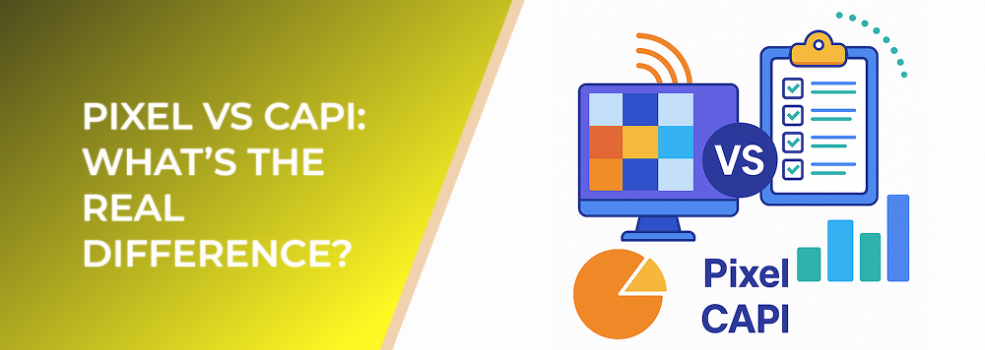When performance tracking becomes less reliable due to privacy updates, the question appears: should you rely on the classic Pixel setup, or switch to Conversion API (CAPI)? The truth is that both tools track the same events — but the way they collect, transmit, and verify data is completely different.
This article compares Pixel and CAPI based on data accuracy, reliability, event match quality, and impact on overall campaign efficiency.
What Pixel Actually Does
Pixel is a browser-based tracking script placed on your site. It records user events such as page views, add-to-cart actions, checkout starts, and purchases.

Globally, about one in three internet users currently use ad-blockers, undermining browser-based tracking
However, browser tracking has become less reliable.
-
Safari’s ITP blocks third-party cookies by default.
-
Over 40% of users browse with cookie limitations.
-
Ad blockers block Pixel scripts in up to 26% of traffic.
As a result, Pixel often loses a significant portion of events — especially deeper funnel conversions.
Key weakness: Data loss grows every year as browsers tighten tracking rules.
What CAPI Actually Does
CAPI sends events directly from your server to the ad platform without depending on the browser.
This means:
-
No impact from ad blockers.
-
No cookie limitations.
-
Higher event reliability.
Advertisers report up to 15–30% more tracked conversions after implementing server-side event tracking.
CAPI also improves Event Match Quality (EMQ) because it can pass hashed customer data (email, phone, etc.), which helps the platform correctly match conversions to users.
Side-by-Side Comparison
1. Data Reliability
Server-side tracking with CAPI often recovers 20–30% of conversions lost when relying on browser-based Pixel only
-
Pixel: Loses data due to blockers and browser restrictions.
-
CAPI: Sends events directly; often recovers 20–30% missing data.
2. Accuracy & Deduplication
Both systems track the same events, but Pixel events rely on client-side sessions.
CAPI events contain first-party data, making deduplication more accurate.
3. Event Match Quality
-
Average EMQ with Pixel alone: 4–6/10
-
Average EMQ with CAPI: 7–9/10
Higher match quality often leads to stronger optimization and lower CPA.
4. Impact on Costs
Studies show that advertisers who implement CAPI see:
-
Up to 13–20% lower CPA
-
Improved delivery on retargeting audiences
Why You Should Combine Pixel + CAPI
The best-performing setups do not choose between Pixel or CAPI — they use both.
Benefits of using both systems:
-
Pixel helps with real-time browser event triggers.
-
CAPI ensures server-to-server reliability.
-
Using both enables deduplication, preventing overcounting.
Together they help advertisers reclaim missing data, stabilize event tracking, and improve algorithm learning.
Common Mistakes Advertisers Make
1. Only turning on CAPI without configuring deduplication
This can inflate reported results.
2. Tracking too many low-value events
Sending unnecessary data can confuse optimization.
3. Not passing advanced user data with CAPI
This reduces the benefits of higher match quality.
When You Should Use Pixel
Pixel still works well for:
-
Basic remarketing
-
Top-of-funnel interactions
-
Real-time event firing (e.g., button clicks)
But relying on Pixel alone can significantly underreport conversions.
When You Should Use CAPI
CAPI is essential for:
-
Accurate purchase tracking
-
Subscription or login-based businesses
-
Recovering blocked or lost conversions
-
Improving attribution and audience building
If you need stable, long-term tracking, CAPI is non-negotiable.
Final Verdict
Pixel and CAPI track the same events but do it differently. Pixel depends on browsers and loses data. CAPI bypasses blockers and gives accurate, verifiable event tracking.
The most effective configuration is Pixel + CAPI together.
This ensures maximum accuracy, stable attribution, and better optimization results.

